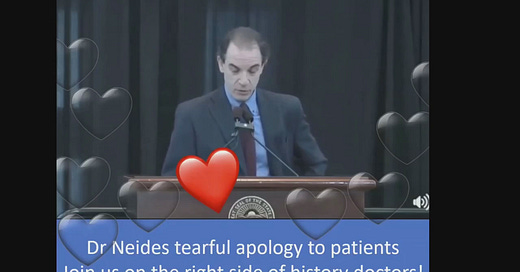In a powerful and emotional testimony, Dr. Daniel Neides, former ed
ucator at the Cleveland Clinic Lerner College of Medicine and Case Western Reserve University, shared his profound concerns about vaccine safety, medical education gaps, and patient care ethics. His candid reflection reveals the struggles of a medical professional confronting institutional limitations while striving to uphold the Hippocratic oath.
The Education Gap in Medical Training
Dr. Neides begins his testimony by highlighting a critical issue in medical education: "There is no education in medical schools that I am aware of, and being an educator at the Cleveland Clinic Lerner College of Medicine and Case Western Reserve University, I am not aware of education around vaccines, their contents, safety records, informed consent, or the vaccine injury compensation program".
This startling admission from a medical educator underscores a systemic problem. Medical professionals are taught to memorize vaccine schedules without deeper understanding of vaccine components, potential risks, or the legal frameworks surrounding adverse events1.
The Informed Consent Crisis
One of Dr. Neides' most poignant confessions concerns his own past practice regarding informed consent:
"I was one of those providers who didn't provide safety sheets before vaccinating. I would tell the parents, these are the vaccines today. We're gonna give you three vaccines in one leg and two in the other. And then after vaccinating either the child or the adult patient, here's your information sheet".
With evident remorse, he adds: "Absolutely deplorable on my part and I apologize to my patients". This acknowledgment highlights a widespread issue in medical practice where true informed consent—providing information before treatment rather than after—is often neglected.
The Double Standard in Medical Response
Dr. Neides points out a troubling inconsistency in how the medical community responds to different types of adverse reactions:
"If I see a patient in the office and diagnose strep throat and give them penicillin, and either the moms or the patient themselves calls and tells me that they developed a rash. There is zero question. The chart now states they have an allergy to penicillin and will never be given it again".
Yet when patients report adverse reactions to vaccines, their concerns are often dismissed or minimized. "Why don't we believe parents and patients when they tell us they have had an adverse event regarding a vaccine? It doesn't make sense to me as a medical professional".
Institutional Pressures and Conflicts of Interest
The testimony reveals concerning conflicts of interest within the healthcare system:
Provider Incentives: "There appears to be a conflict of interest regarding payments to providers for completing vaccine schedules"
Patient Dismissal: "Patients are being dismissed from practices because of quote-unquote vaccine safety concerns"
Employment Mandates: "Employers are forcing employees to receive the flu vaccine or face corrective action or job loss"
These institutional pressures create an environment where questioning vaccine safety can have serious professional consequences.
Scientific Concerns About Vaccine Studies
Dr. Neides raises important questions about the scientific methodology behind vaccine safety studies:
"Why do the placebos in vaccine studies contain the adjuvants like mercury and aluminum? Aren't placebos supposed to be inert? In other words, if you're comparing, let's say, the hepatitis B vaccine against the placebo, why does the placebo contain a metal, if the concern could possibly be the metal itself that's triggering the autoimmunity".
This methodological issue potentially undermines the validity of safety studies by comparing vaccines not against true placebos but against solutions containing potentially problematic ingredients.
A Personal Transformation
The testimony concludes with Dr. Neides sharing his personal journey and new direction:
"What I now realize that this has been the kick in the behind that I personally needed to get out from under a multi-billion dollar conglomerate in order to really do the work that I feel needs to be done, both in educating the public and taking care of my patients that have any chronic disease, but in the way that I really feel they need to be treated".
His new medical practice, Inspire Wellness, represents his commitment to practicing medicine according to his conscience rather than institutional protocols.
A Call for Open-Minded Inquiry
Dr. Neides emphasizes the need for continued investigation into potential links between vaccine ingredients and the rising rates of chronic conditions:
"Why has the rate of autism spectrum disorder gone from one in a thousand in 1990 as I was taught to one in 48 in 2017? Is there a link between the toxins in vaccines and the significant increase in the diagnosis? Not only of ASD, we certainly know about a risk of Guillain-Barre, but what about attention deficit disorder, mood disorders in children? and just the overall chronic disease epidemic in this country".
He concludes with a call for open-minded inquiry: "Be open to new ways of thinking and that's what we all need to do in medicine moving forward".
This article was brought to you by News and Knees Substack. Our independent journalism relies on reader support to continue bringing you these important stories. If you value in-depth reporting on healthcare issues that affect us all, please consider becoming a paid subscriber. Your subscription directly enables us to pursue truth and accountability in medical reporting.














Share this post